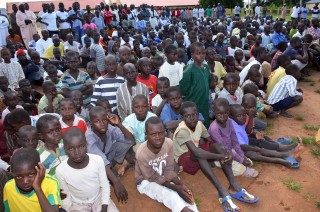Since Thursday morning, Nigeria has been agog with the news of the release of 21 out of the over 200 school girls that were abducted by Boko Haram fighters in Chibok town more than two years ago. Indeed, it is a commendable feat for the present government, which has promised to ensure the rescue of the kidnapped girls.
However, all cannot be ‘well’ if other arguably graver Boko Haram-induced scourges fester. The famine being witnessed in the Internally Displaced Persons (IDP) camps is yet to be properly addressed by the Nigerian authorities and this poses a great danger to the lives of those who managed to escape the onslaught of the insurgents at first.
While addressing a world press conference on Thursday, Nigeria’s information minister, Lai Muhammed said, “We see this as a credible first step in the eventual release of all the Chibok Girls in captivity. It is also a major step in confidence-building between us as a government and the Boko Haram leadership on the issue of the Chibok Girls.”
With the latest release, the Nigerian government now has more leverage to pursue another negotiation that would lead to the release of more of the captured girls. Considering the political point scored with the widespread good news of the released Chibok girls and the consistent agitation that has kept the government on its toes – #BringBackOurGirls campaign, there is the tendency that the Nigerian government will be more interested in seeing more of these Chibok girls released than resolving other Boko Haram-related issues.
The humanitarian crisis in the IDP camps in northern Nigeria is yet to receive adequate and deserved response both locally and internationally. As opposed to the assessment of the Nigerian government that has downplayed the fatal crisis in the camps of the displaced persons, Toby Lanzer, the top United Nation (UN) official focused on humanitarian aid for the region has described the situation in those camps as “a famine unlike any we have ever seen anywhere.”
Extreme hunger is real in the IDP camps. In August, hundreds of these displaced persons who are in camps in Borno state could not hold on any longer, as they protested the ill treatment they receive. Zakari Modu, one of the IDPs said they can be better described as “prisoners without food”.
The protracted negligence of the Nigerian government plus the long inaction and silence of prominent international organization towards the crisis in the north east has helped it to grow rapidly. According to Doctors Without Borders, the mortality rate in some camps and informal settlements is five times what is considered an emergency.
The United Nations Children’s Fund (UNICEF) has warned that as many as 75,000 children will die in famine-like conditions in Borno state alone. The situation is worsened by the inability of the now increased personnel of the United Nations to access vulnerable areas where the Boko Haram insurgents still operate to distribute relief materials. Those held in these areas have been estimated to be about 2 million.
Corruption in the management of the IDP camps has also retarded progress. There have been reports of officials diverting food meant for the IDPs to their own houses. In the light of worsening situation in these IDP camps, the Nigerian Senate acknowledged the mismanagement and promised to look into it.
Baba Kaka Bashir Garbai, a senator representing Borno Central said, “…Notwithstanding the huge budgetary allocation by the National Assembly and the various releases by the Executive…including significant donations from many donors, the situation on ground is not cheering.”
The conditions pointing to the undone job of the Nigerian government are staggering. Despite the intervention of the United Nations and other international agencies and bodies, the role of the affected country in fighting the beaming famine cannot be pushed across to other bodies.
The rescue of 21 school girls is not enough for the government to continue to celebrate victory over Boko Haram. In fact, if the government is able to successfully rescue all the over 200 Chibok girls, push the insurgents out of Nigerian territories but leave the victims of this crisis to die of hunger; it still can’t claim victory over Boko Haram.








